Source: umagazine
Text: Cecilia Ma
Some say Macao is blessed by a lack of natural disasters and energy shortages. But Lam Chi Seng, a native of Macao who completed his bachelor’s, master’s, and PhD studies at the University of Macau (UM), thinks differently. Knowing that energy shortage is a global issue which, if left unaddressed, will eventually affect everyone in the world, Lam has spent many years in search of ways to reduce energy waste. In 2006, Lam and his team at UM began developing a power quality compensator, which they hope will benefit not just the local community, but the rest of the world.
Contributing to Environmental Protection and Energy Conservation through Scientific Research
‘We hope to find a way to reduce power consumption to save energy,’Lam says. Lam started his bachelor’s degree programme in electrical and electronics engineering at UM in 1999. After completing his bachelor’s studies, he went on to pursue master’s and PhD degrees at UM on scholarships from the Macao Foundation and the Macao SAR government, respectively. His first job was also at UM. While a master’s student, Lam tried to find feasible solutions to power quality pollution and energy shortage by using his expertise in the fields of electricity, power electronics, and electricity distribution network. After completing his master’s studies, he teamed up with Prof Wong Man Chung from the Department of Electrical and Computer Engineering, who was the supervisor of his master’s thesis. Together, they began developing a low-cost and low-loss power quality compensator.
In 2006, Lam and Wong received support from the Science and Technology Development Fund of the Macao SAR and UM Research Committee, which allowed them to carry out the research project. They proposed new system structures, theories, and control algorithms, and established the first-generation power quality compensator platform. In the beginning, Lam worked as an engineer at UM’s Campus Development and Engineering Section during the day and conducted research in the Power Electronics Laboratory at night. But working day and night was not the most difficult aspect. The real challenge was to break through the bottlenecks in his research and develop new circuit structures and control algorithms.
In 2009, after having developed preliminary theories and technologies and established the first-generation compensator platform, the team began to study a series of new technical problems that might occur in a low-cost and low-loss power quality compensator. They gradually developed some new circuit structures and control algorithms and went on to publish more than 20 academic papers at international conferences and in international journals, including some top journals in the field of power electronics, including the IEEE Transactions on Industrial Electronics (with an impact factor of 6.5 in the Science Citation Index for the 2013/2014 period) and the IEEE Transactions on Power Electronics (with an impact factor of 5.726 for the 2013/2014 period). In 2014, Lam and Wong published their research results in a book entitled ‘Design and Control of Hybrid Active Power Filters’; the book was published by Springer, the world’s largest publisher in the fields of science, technology and medicine. In the same year, their research project also received the third prize in the Technological Invention Award category at the Macao Science and Technology Awards. They also applied for patents in China and the United States, two of which have been granted. The team is now working on converting their patented technologies to products that have applications in everyday life.
Developing Power Quality Compensator From Scratch
Over the past decade, Lam and his team have developed three generations of power quality compensators. ‘The current power quality compensator is in its third generation,’ says Lam.‘Not only can it significantly reduce the cost and operating loss of active power quality compensators that are currently available on the market, it also helps to increase the efficiency of power transmission and distribution and protect electrical equipment, thereby realizing energy conservation and reducing carbon dioxide emission.’ The compensator is entirely ‘made in UM’. Everything, from concept development, to circuit construction, to control algorithms, was undertaken by Lam and Wong and their team members from scratch. The cost of this UM-developed compensator is lower than that of the active power quality compensators that are available on the market, and it is estimated that the operating loss will be reduced to between 2 per cent and 3 per cent. ‘In addition to environmental protection and energy conservation, the compensator can bring substantial economic benefits to major power consumers by helping them reduce electricity bills. So it creates a win-win situation for both power consumers and suppliers,’ says Lam.
It took Lam and his team members nearly a decade to successfully develop the latest version of power quality compensator. They have already installed it on a test site in Macao for testing purposes.
Life-changing Mentors
‘Technology brings convenience to people’s lives!’ It was this simple thought that drove the young Lam to dream of becoming an engineer or scientist. In 1999, the year Macao returned to China, he was recommended by UM for direct admission, bringing him one step closer to realising his dream. Teaching is a profession that allows one life to influence many others. It is no exaggeration to say that a good teacher can change a student’s life. Lam’s career choice was deeply influenced by the life-changing mentors he met at UM. After receiving his bachelor’s degree, Lam chanced upon a lecture by Prof Wong about power quality, environmental protection, and energy conservation. Feeling that power quality pollution and energy shortage are global issues, Lam decided to pursue further studies in these areas. Having known each other for 15 years, Lam and Wong are not just teacher and student, but also kindred spirits. Another life-changing mentor for Lam is his PhD supervisor Prof Han Yingduo, a renowned expert on power systems and their automation and member of the Chinese Academy of Engineering. ‘The difference between a boss and a leader is that a boss calls from the top of a mountain for the others to climb up as quickly as possible, while a leader climbs the mountain with the others, everyone supporting everyone else along the way,’ says Lam. ‘But my two mentors go one better. They are willing to lie on the ground, helping young people up the mountain one by one.’ Lam is deeply influenced by the humility and the generous guidance from the two mentors. A teacher himself now, he is always reminded to do the same for his students.
Chips, A New Beginning
Merely in his 30s, Lam’s research career is just beginning. In August 2013, Lam joined UM’s State Key Laboratory of Analog and Mixed- Signal VLSI as an assistant professor, focusing on combining power electronics, his long-time area of expertise, with microelectronics chip technologies. ‘My first goal is to improve the effectiveness of electrical installations and electronic equipment through chip technologies, and to apply chip technologies to power grids and smart grids, to make them more stable and efficient so as to conserve energy,’ Lam says. ‘I also hope to apply my experience in power electronics to chip development to increase the effectiveness of power management chips.’
Albert Einstain once said, ‘Genius is 1% inspiration and 99% percent perspiration.’ Without the hard work over the past decade, Lam and his team would not have been able to achieve what they have achieved today. ‘Our ultimate goal is to promote our low-cost and low-loss power quality compensator on the market to improve people’s lives,’ he says.

Macao’s Power Electronics Expert Lam Chi Seng
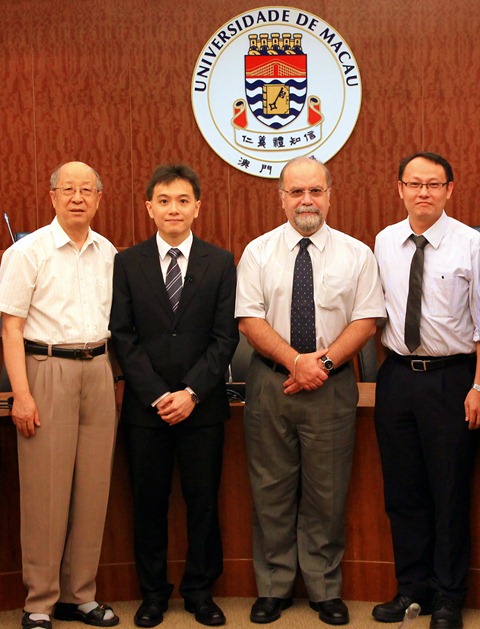
Lam Chi Seng with his two mentors Prof Han Yingduo (1st from right) and Prof Wong Man Chung (1st from left)
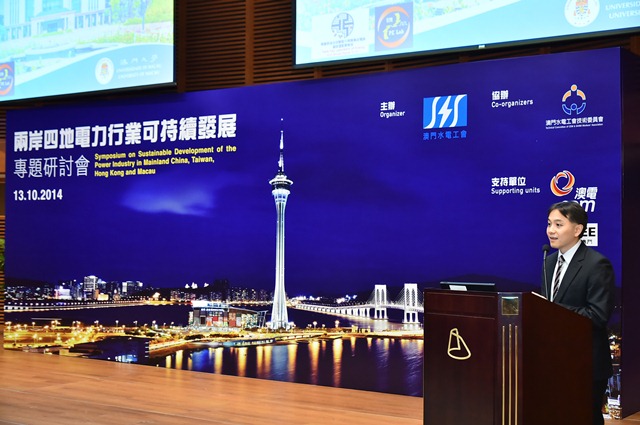
and UM Vice Rector (Research) Rui Martins
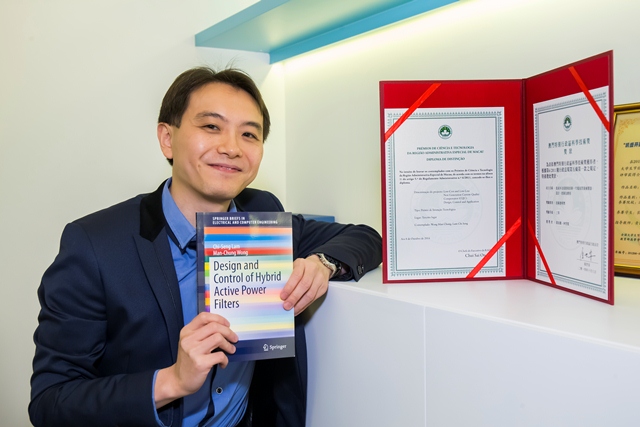
after completing his PhD
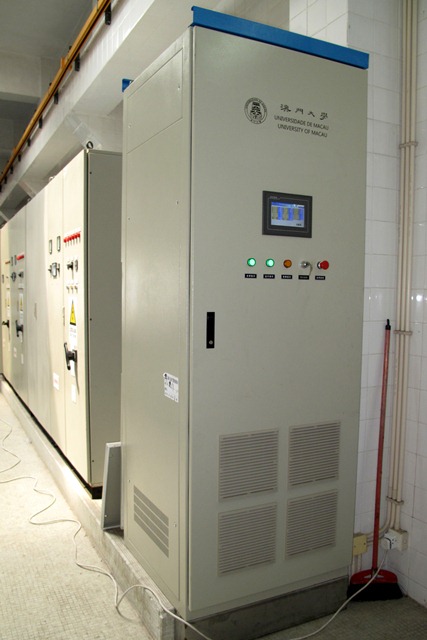
Lam Chi Seng giving a keynote speech at an academic conference
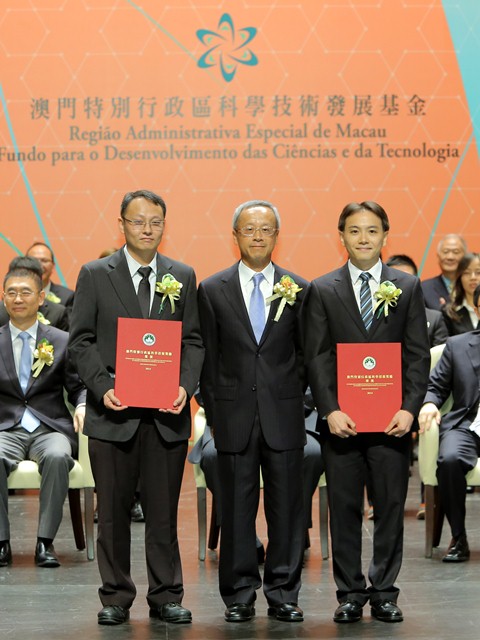
Lam Chi Seng has received various awards for the power quality compensator
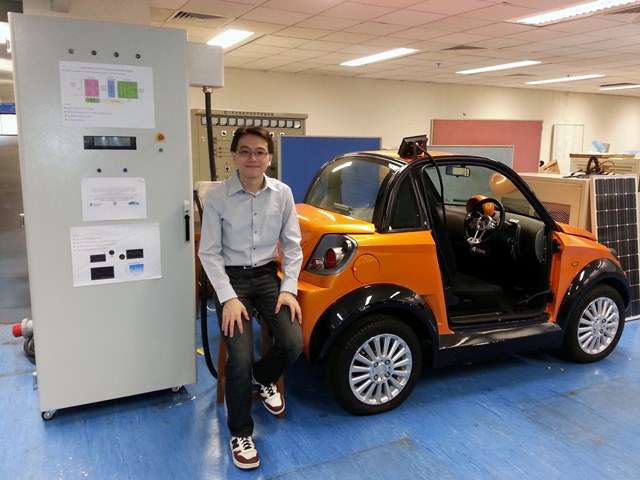
The power quality compensator has been granted patents in China and the United States

